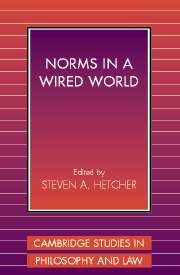Introduction
Published online by Cambridge University Press: 05 June 2012
Summary
Social order may be regulated from above by the law, but its foundation is built on norms and customs which combat social disarray, allowing people to make meaningful and productive uses of their time and resources. The law's ability to promote a just social order can never be fully understood without taking account of the concurrent influence of these informal social practices. In spite of this, much jurisprudential writing has been devoid of sustained discussion of norms and customs, focusing instead on individuals and governments. Individuals are thought to be the locus of moral responsibility and rational decision making, while governments are thought to be the source of legal obligations that form the institutional backdrop against which moral and rational behavior occur. In concentrating on the small individual below and the vast, looming state above, those mid-sized objects of the social world – norms and customs – have been neglected.
Recently, legal theorists have begun to pay attention to social norms. The newlegal literature draws on importantwork emanating from the social sciences as well as from moral and political philosophy, evolutionary biology, and anthropology. Nearly all the newwork by legal scholars utilizes rational choice methodology. This book also presents an analysis in the rational choice tradition albeit one that incorporates moral theory into the analysis as well. One of the underlying themes in this book is the compatibility of rational and moral analysis.
The present work seeks an equilibrium between theory and legal application.
- Type
- Chapter
- Information
- Norms in a Wired World , pp. 1 - 14Publisher: Cambridge University PressPrint publication year: 2004

